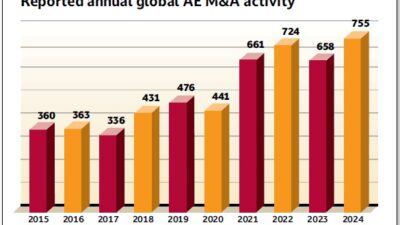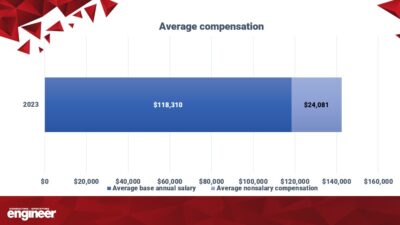Respondents to the 2024 salary study were paid better, especially bonuses.

Engineering salary survey insights:
- Explore the 10th annual Consulting-Specifying Engineer salary survey to uncover key insights into compensation trends for mechanical, electrical, fire protection and lighting engineers, including a 3.4% rise in average base salary to $118,310 in 2023 and significant growth in nonsalary bonuses.
- Dive into the full report to understand how industry challenges, shifting demographics and emerging technologies are shaping the future of engineering careers — download it now for detailed data and analysis.
The 10th annual Consulting-Specifying Engineer salary survey of mechanical, electrical, fire protection and lighting engineers shows that the average base annual salary in 2023 was $118,310, an increase of 3.4% over 2022 data. More than half (62%) of this year’s respondents received a salary of more than $100,000.
Eight in 10 (84%) respondents reported their total compensation increased from 2022 to 2023. A third (38%) said the increase was up to 4%, 29% said 5% to 9%, and 17% said 10% or more. About one in 10 (13%) reported no change in compensation.
The average base salary among engineering professionals has increased 19.3% between 2014 and 2023, according to the annual report. Average salaries rose from $99,100 in 2014 to $118,310 in 2023. Average nonsalary compensation has also increased by 89.3% since 2014, with a huge jump in 2023 bonuses. See Figure 1 for detail on how salaries have grown.

Nearly eight in 10 (77%) respondents received nonsalary compensation (e.g., bonus, profit sharing, stock shares) in 2023. The average amount received was $24,081.
From the 2023 study results, 29% are 60 or older, 21% are 50-59 years old, 19% are 40-49 years old and 20% are 30-39 years old. Only 11% are under 30 years old (see Figure 2).
Younger staff, defined by the U.S. Department of Labor as 40 or younger, equate to 31% — about the same as last year’s survey respondents, which reported 27% in this age group.

Challenges this year included:
- Changing client expectations and demands: 38%
- Pressure to reduce project timelines and costs: 37%
- Poor communication between consultants, architect, etc.: 26%
- Not enough junior team members to prepare for the future: 25%
- Not enough people working on a project: 22%
Total compensation went up in 2023 in both base salary and nonsalary compensation. Nonsalary compensation was awarded for two primary reasons:
- Company profitability: 52%, up from 48% last year.
- Personal performance or promotion: 45%, up from 41%.
When comparing compensation, the numbers changed again this year. Those who specify fire protection/life safety systems made the most, making an average of $162,634, a significant jump from $102,500. Electrical/power system designers came in second, earning $145,255, a slight decrease from $147,182. Mechanical engineers came in next, earning $134,458, an increase from $123,477. See Figure 3.

Most (59%) of respondents directly manage another employee, and 39% manage up to five people. And when asked about challenges, 17% said they didn’t receive enough training or mentoring.
See the compensation tables for a more detailed breakdown. Download the full report here.
A changing industry





According to the survey, 10% of respondents are looking to change jobs in the next year and 24% aren’t sure, meaning about one-third of employees could be looking for a new position. A consistent two-thirds of respondents are not looking for a new job.
Though they aren’t looking for jobs, they are looking ahead to technologies that will significantly change their jobs. The top five responses:
- Artificial intelligence replacing human decision-making: 36%
- Shift toward sustainable and green building practices: 35%
- Difficulty keeping up with new technologies and software: 33%
- Rapid changes in building codes and regulations: 33%
- Cybersecurity threats to engineered systems and data: 30%
Survey methodology
A survey was emailed to Consulting-Specifying Engineer audience members and information was collected in September and October 2024. A total of 261 qualified responses were returned, with a margin of error of +/-6.1% at a 95% confidence level. Participants frequently had the option to select more than one response, thus totals do not always equal 100%. Download the full study.


